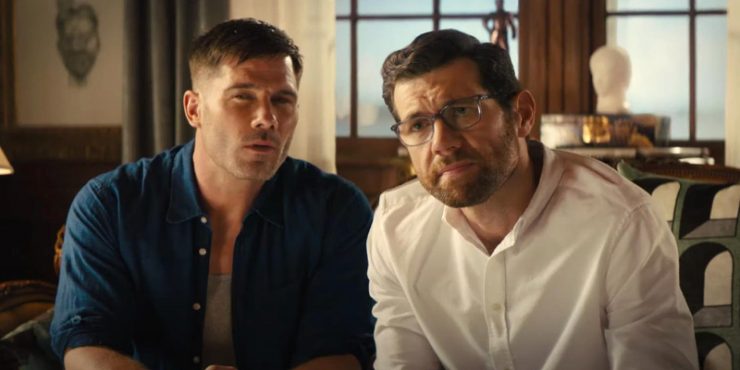The death of the romantic comedy has been declared high and low. Some say that it’s because Hollywood has sworn off all mid-budget adult movies to further invest in blockbuster spectacle, while others claim that movie stars today lack the charisma necessary to make a rom-com successful. Both arguments are true to some degree, but a more uncomfortable truth is that people are not willing to watch the few good ones that are still made. How else can one explain the monetary failure of Bros, a film that succeeds on every metric a film could be measured on, with the sole exception of box receipts? A confused, sometimes abrasive, marketing campaign did the movie no favors, but it was not so long ago that a movie this good was able to overcome all of that. So, what’s changed?
The degree to which television has immersed itself deeply into our lives, especially since the Pandemic, has given us a wealth of options for adult stories in all genres in the comfort of our own home. In the last three years, there are still a lot less people who will go to the movies to see a movie like Bros when they can just sit on their couch and watch something like The Other Two on HBOMax (a phenomenal show which I highly recommend). Not even Judd Apatow, this century’s high prince of Hollywood comedy, could get this movie to be a hit. Bros stars Billy Eichner, the comedian and television star, who became a cult hit with his YouTube show Billy on the Street before starring in three seasons of the criminally underrated Hulu show Difficult People. Anyone who watched those series knew that Eichner was made for stardom, and Bros is the perfect vehicle for him.
Eichner’s style – aggressive, loud, outright rude – is inherently abrasive to audiences (consider his handful of episodes of Parks and Recreation, where his explosive indignation nearly capsized a show whose tone was the exact opposite). Bros is co-written by Eichner and is suited to his strengths, giving him ample opportunity to tee off at high volume about his innumerable grievances, while still finding ways to show vulnerability that feels natural to his character – this is a romance after all. Eichner wrote the film with Nicholas Stoller, who also directs. Stoller is part of Apatow’s stable of directors, and is the one usually tapped for the more sensitive material like Forgetting Sarah Marshall or The Five-Year Engagement. His films are never stellar pieces of filmmaking (would love for someone to teach him about proper match cutting), but Stoller knows his way around performances and he knows how to coax sincerity without sentimentality.
Eichner plays Bobby Lieber, an influential podcaster whose show discusses the depth and scope of queer history. He’s parlayed this into becoming the curator of the first National LGBTQ+ History Museum in Manhattan, a job that he discovers has less to do with foregrounding under-sung queer icons and more to do with appeasing various community groups and begging people for donations to ensure that the museum can, in fact, open. In his personal life, Bobby is a proud bachelor, accepting his life of misanthropy and empty hookups on Grindr. At a club he meets Aaron (Luke Macfarlane), a devastatingly handsome estate lawyer with a sculpted body. Bobby’s friend, Henry (Guy Branum, hilarious in small windows), describes him as gorgeous but boring, but as Bobby and Aaron talk, flirtations arise. Aaron makes it clear: he’s not a relationship guy. That’s okay with Bobby, he isn’t either.
From the jump, Bobby is convinced that he isn’t attractive enough for Aaron, and Aaron’s insistence on a casual, no-strings-attached relationship doesn’t give him any confidence. But their personality clashes lead to opposites attract chemistry. Aaron’s bodybuilder physique and straight-passing behavior (he likes The Hangover) is the other end of the spectrum of Bobby’s perpetual aghast, but they eventually discover that they enjoy each other’s differences, and against the odds, discover they may want to do something they’ve never done before: be in a committed relationship. This doesn’t come without its growing pains, including Bobby’s refusal to tone down his scorched earth militance or Aaron’s hesitance to fully embrace the spectrum and significance of a gay lifestyle.
This is a genuinely sweet movie that is genuinely very funny. It borrows smartly from rom-com classics, especially Rob Reiner’s When Harry Met Sally…, but still feels unique and authentic. Its story and many of its jokes are broad in nature, even if they are about a lifestyle many mainstream straight audiences will not be familiar with. The script avoids obvious pitfalls like making outright homophobia the main villain. Instead, it’s the subtle behavior of allies – and how their support always falls short – that gets the most needling, in both funny and incisive ways. Despite the desperation of the marketing of Bros, which conflated buying a ticket with LGBTQ+ advocacy, the movie itself is much less self-serious, successfully poking fun at both Aaron’s heteronormativity and Bobby’s affronted discontent.
The movie has a wide cast of supporting characters, including Married… With Children‘s Amanda Bearse as Aaron’s well-meaning mother and Monica Raymund as Bobby’s concerned straight friend. Board room scenes where Bobby must plan the museum’s opening include Community‘s Jim Rash, as well as queer actors Ts Madison, Eve Lindley, Miss Lawrence, and Dot-Marie Jones. Cameos by Bowen Yang, Harvey Fierstein, and Debra Messing get big laughs. In this regard, the Apatow template is followed pretty closely. But it’s the performances from Eichner and Macfarlane that make the film work so well. In a finale made like the classic romances of old, the two actors find that perfect sweet spot of fulfilling the rom-com fantasy while still managing to feel like real characters. As you watch you will actively think to yourself: “They really just don’t make ’em like this anymore”.
Directed by Nicholas Stoller










